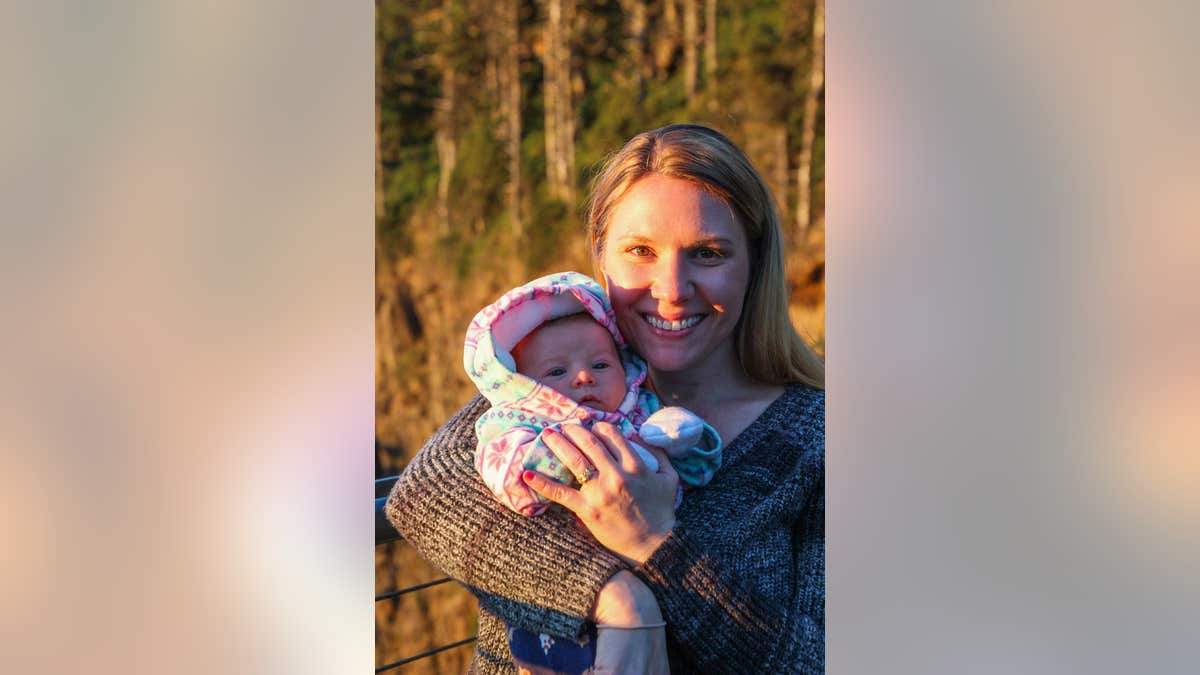
Ginger McCall and her daughter, Evianna Rose. (Ginger McCall)
A Salem, Oregon woman is warning others about an infection that can have fatal consequences for infants after she reportedly lost her daughter roughly seven weeks after giving birth.
Earlier in March, Ginger McCall’s first-born child, Evianna Rose, showed signs of developing group B strep disease. The bacterium is usually found in the intestines or “lower genital tract” in adults and is generally harmless. In infants, however, group B strep bacteria can be fatal; the Centers of Disease Control and Prevention (CDC) says it is “a leading cause of meningitis and bacteremia in a newborn’s first week of life.”
In babies — especially those who have late-onset group B strep disease — symptoms typically include fever, difficulty feeding and breathing and lethargy, among other signs.
NEWBORN HAS PARTIALLY DEVELOPED TWIN REMOVED FROM ABDOMEN DAY AFTER BIRTH
"She was making this really terrible mewing, moaning noise — like a kind of repetitive ... it was like a weak cry," McCall, 35, told Fox 12 of her newborn's symptoms prior to her untimely death.
Doctors normally test women for group B strep as they’re nearing the end of their pregnancy, or roughly around 35 to 37 weeks, according to the CDC. If a mom-to-be tests positive, (about 1 in 4 pregnant women carry group B strep bacteria in their rectum or vagina, says the federal health agency), she is given antibiotics intravenously during labor to prevent the bacteria from spreading to her child during birth.
McCall told Fox News she tested positive for group B strep during pregnancy. She also claimed she received antibiotics during labor.
When her baby's health did not improve, the Oregon woman took her to the emergency room at Salem Health, where she was allegedly administered a saline drip and Tylenol before she was discharged.
But McCall said she was immediately concerned not enough was done for Evianna.
"I will never forget the nurse saying to me, 'This is her immune system getting stronger. This is her getting stronger.' And it wasn’t. It was her dying," she declared to Fox 12, claiming she also informed doctors at Salem Health she tested positive for group B strep while pregnant.
Evianna’s condition soon worsened and she was eventually transported to Portland's Doernbecher Children's Hospital.
The new mom was then informed of her infant daughter’s grave diagnosis: Evianna had developed both meningitis and sepsis as a result of late-onset group B strep.
On March 17, two days after McCall said she first took Evianna to Salem Health, the young girl died.
"Every minute that they delayed, every minute that they didn’t conduct the tests that they should’ve conducted, every minute that we spent driving between places. That mattered. It mattered,” she said of hospital staff members that first treated Evianna.
When questioned if she plans to take legal action against Salem Health, McCall told Fox News she and her husband "are still figuring out how to move forward."
"What I'm most interested in is forcing the hospital to re-examine its protocols so this doesn't happen again. This is the second death like this in a relatively small city within a year," she said, referring to another Salem mother who claimed her 7-month-old son died of bacterial meningitis in May 2018.
NEW YORK MOM GIVES BIRTH TO 15-POUND BABY GIRL: 'IT WAS PRETTY VIOLENT'
"Evi had late-onset [group B strep disease] so it is unlikely that the antibiotics that I received during labor would have made a difference for her," she noted.
That said, "what would have made a difference is prompt identification of her meningitis and sepsis symptoms the first time I went to the ER and prompt treatment with the appropriate antibiotic," she added.
For now, McCall hopes to raise awareness, particularly of late-onset group B strep disease and meningitis. She said she has reached out to Salem Health to "find out what they plan to do to prevent these deaths in the future."
In a statement to Fox 12, a spokesperson for Salem Health called the loss “heartbreaking” but declined to comment on McCall’s case, citing privacy laws.




















